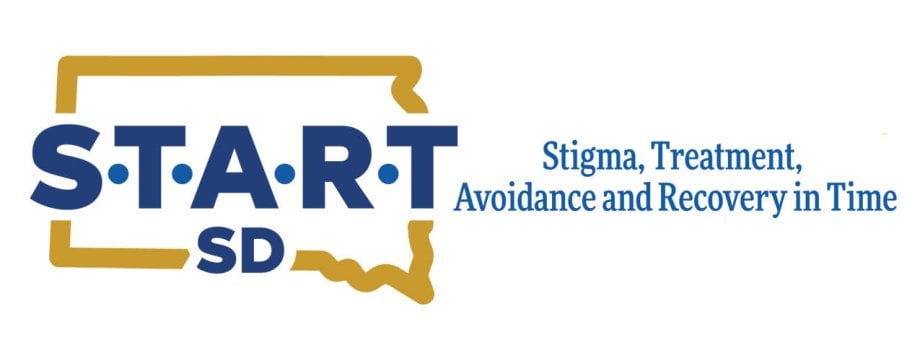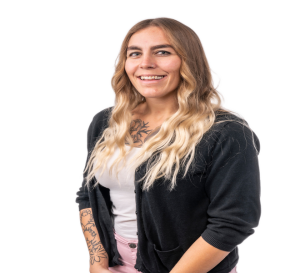SUC: Can you tell us a little about yourself and your background?
Whitney: Absolutely. I’m a person with lived experience with depression, trauma, and grief. Those experiences are interwoven with who I am today and are the foundation of why I’ve pursued the work I have. I’m also a member of the LGBTQIA+ community. My wife, Amanda, and I have two rescue German Shepherds – CC, who is 12.5, and Abby, who is 4.5. I love to read, do anything outside, and travel (especially when we can take CC and Abby).
SUC: What motivated you to join Straight Up Care?
Whitney: I first learned about Straight Up Care in November or December 2022 and fell in love with its mission. I’ve seen how our current healthcare system minimizes the value peers offer and significantly underpay them for their work. What really inspired me was that SUC is not just training people to be peer specialists; SUC is changing the peer support system by empowering peers to take control of their careers and ensuring they are paid what they deserve. I’m honored to have the opportunity to be part of such impactful and meaningful work.
SUC: Could you walk us through your career journey leading up to this role?
Whitney: As I mentioned, I have lived experience with depression, trauma, and grief. This all began when I was six and my father died in a plane crash. I only ever had two responses to the childhood question of “what do you want to be when you grow up?” For me, it was either a lawyer to work for families like mine, or to be a counselor to grieving children. I ended up on the second of the two, and obtained my master’s in counseling psychology, and eventually became a licensed professional counselor. My first job out of graduate school was at a methadone maintenance clinic – it was the only place willing to hire someone fresh out of grad school whose internships were working with grief. I hadn’t had a single class in addiction and didn’t know anything. What I realized, pretty quickly, was that I was working with the “grown up” versions of the grieving and traumatized children I had gone to grad school hoping to work with. I learned that addiction is not a moral failure or character flaw, that it is rooted in pain, despair, loss, shame, etc. After the methadone clinic I tried to focus on kids and grief, but I kept being pulled back to working with individuals with substance use disorder and realized I had a passion for the population. In the years since the methadone clinic, I have worked with kids and adults, in various levels of care, owned a private practice, worked for a university on SUD-related implementation projects, and was the director of substance use programs at a large county jail (my favorite role interacting with individuals with SUD!). I’m a member of the editorial board for the forthcoming The ASAM Criteria, 4th Edition, served as the lead editor for the section on assessment, reassessment, and measurement based care, and am an ASAM Criminal Justice Expert Committee Member, “The ASAM Criteria, Fourth Edition Volume 3: Correctional Settings & Community Reentry.”
SUC: How do you see your professional experience, particularly your clinical roles, benefiting your work at Straight Up Care?
Whitney: I think it’s important for me to acknowledge that clinical experience is not the same as lived experience or peer services. I see my various professional experiences, both clinical and not, as informing my work at SUC, but not driving it. It would be a significant disservice to the peers in our community if I focus on wearing my “clinical” or “licensed professional counselor” hats. Instead, I plan on leveraging those experiences to benefit the peers in our community. I’m focused on using my professional career to advocate for peers, spotlight their incredible work, and offer them the resources to achieve their goals.
SUC: You mentioned you’re a licensed professional counselor, not a peer specialist.
Whitney: Yet – I’m not a peer specialist yet. I am a peer – I have had my challenges, fought depression and overcome my trauma history. I’m currently working towards my peer specialist certification.
SUC: Why do you believe in peer services?
Whitney: I see peer services as being a mutually beneficial service to both the individual and the peer specialist. What really excites me is the opportunity for the peers. Let me explain with a story. While I was the director of substance use programs at our county jail, I oversaw the creation of a peer support component, which meant identifying individuals in our program, incarcerated individuals, to serve as our first peers. We identified Mr. Doe, a middle-aged black man – I’m specifying his race so to highlight the additional stigma and discrimination he faced in addition to, and intersecting with, his incarceration status – who had been in and out of jail for decades. He had an external facade of the grumpy old guy. Working with his counselor, the truly kind and caring individual emerged. Mr. Doe was identified by the staff as the ideal peer. When his counselor shared this with him and asked if he’d consider being one of the first peers in the program, Mr. Doe was stunned. He couldn’t believe we thought so highly of him. He was an excellent peer support in the program, is now a certified recovery specialist, and I’m happy to say I’ve actually run into him at professional trainings and conferences in the community. I saw the hope and purpose that being a peer offered Mr. Doe. Ever since, I’ve been advocating for centering the opinions of individuals with lived experience.
SUC: What’s one of your self-care activities?
Whitney: If it’s okay, I’d like to share two. A little over a year ago I started to run regularly. I’ve noticed it has had a tremendous positive impact on my overall wellness. When I’m in a state of stress and need to disengage for a moment of self-care, I like to color. I go through phases of preferring crayons vs colored pencils vs markers. Right now I’m loving markers.
SUC: Is there anything else you’d like to share?
Whitney: I think so. My personal mission is to eliminate barriers and cultivate opportunities for others to achieve their self-defined success, meaning, and fulfillment, which is exactly what Straight Up Care is doing for individuals and peer specialists. I’m humbled and honored to be part of such important work and excited to contribute to the new era of peer support being led by Straight Up Care.


